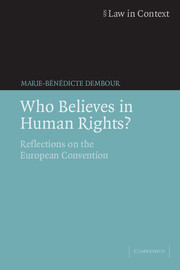Book contents
- Frontmatter
- Contents
- Acknowledgements
- Table of cases
- List of tables
- 1 Introduction
- 2 The Convention in outline
- 3 The Convention in a realist light
- 4 The Convention in a utilitarian light
- 5 The Convention in a Marxist light
- 6 The Convention in a particularist light
- 7 The Convention in a feminist light
- 8 The human rights creed in four schools
- 9 Conclusion: In praise of human rights nihilism
- Appendices
- Select Bibliography
- Index
4 - The Convention in a utilitarian light
Published online by Cambridge University Press: 03 February 2010
- Frontmatter
- Contents
- Acknowledgements
- Table of cases
- List of tables
- 1 Introduction
- 2 The Convention in outline
- 3 The Convention in a realist light
- 4 The Convention in a utilitarian light
- 5 The Convention in a Marxist light
- 6 The Convention in a particularist light
- 7 The Convention in a feminist light
- 8 The human rights creed in four schools
- 9 Conclusion: In praise of human rights nihilism
- Appendices
- Select Bibliography
- Index
Summary
[Utilitarianism remains] open to the very serious objection that, because it is solely concerned with consequences in terms of the production of beneficence, it obliterates some important elements in our moral and political vocabulary, namely equality, justice and rights.
(Barry)Bentham's critique of the French Declaration was not primarily utilitarian in inspiration. As we have seen in the previous chapter, ‘Anarchical Fallacies’ denounced three aspects of the Declaration: its meaninglessness, the risk of insurrection it allegedly generated, and the emptiness of its promises. A text directly derived from utilitarianism (rather than merely compatible with it) would have been chiefly concerned firstly with opposing an absolutist reasoning and secondly with stressing the need to pursue the general interest. Why this is so will become clear below.
I cannot think of a classical text which presents a utilitarian critique of human rights. By contrast, the literature is replete with critiques of utilitarianism which lament its antagonism to the idea of individual human rights, as in the statement at the head of this chapter. In response, utilitarians often defend their political philosophy by saying that they are not opposed to rights, to which their detractors reply that they (the utilitarians) can never truly believe in rights. This debate, which is directly relevant to this part of the human rights credo which asserts that human rights are ‘fundamental’ and ‘inalienable’, provides the starting-point of this chapter.
- Type
- Chapter
- Information
- Who Believes in Human Rights?Reflections on the European Convention, pp. 68 - 113Publisher: Cambridge University PressPrint publication year: 2006

